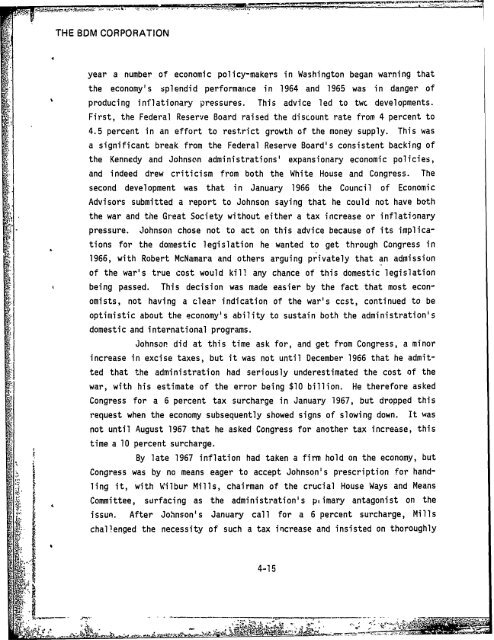policy - The Black Vault
policy - The Black Vault
policy - The Black Vault
You also want an ePaper? Increase the reach of your titles
YUMPU automatically turns print PDFs into web optimized ePapers that Google loves.
THE BDM CORPORATION<br />
year a number of economic <strong>policy</strong>-makers in Washington began warning that<br />
the economy's splendid performance in 1964 and 1965 was in danger of<br />
producing inflationary pressures.<br />
This advice led to twc developments.<br />
First, the Federal Reserve Board raised the discount rate from 4 percent to<br />
4.5 percent in an effort to restrict growth of the money supply. This was<br />
a significant break from the Federal Reserve Board's consistent backing of<br />
the Kennedy and Johnson administrations' expansionary economic policies,<br />
and indeed drew criticism from both the White House and Congress. <strong>The</strong><br />
second development was that in January 1966 the Council of Economic<br />
Advisors submitted a report to Johnson saying that he could not have both<br />
the war and the Great Society without either a tax increase or inflationary<br />
pressure.<br />
Johnson chose not to act on this advice because of its implications<br />
for the domestic legislation he wanted to get through Congress in<br />
1966, with Robert McNamara and others arguing privately that an admission<br />
of the war's true cost would kill any chance of this domestic legislation<br />
being passed.<br />
This decision was made easier by the fact that most economists,<br />
not having a clear indication of the war's ccst, continued to be<br />
optimistic about the economy's ability to sustain both the administration's<br />
domestic and international programs.<br />
Johnson did at this time ask for, and get from Congress, a minor<br />
increase in excise taxes, but it was not until December 1966 that he admitted<br />
that the administration had seriously underestimated the cost of the<br />
war, with his estimate of the error being $10 billion. He therefore asked<br />
Congress for a 6 percent tax surcharge in January 1967,<br />
request when the economy subsequently showed signs of slowing down.<br />
but dropped this<br />
It was<br />
not until August 1967 that he asked Congress for another tax increase, this<br />
time a 10 percent surcharge.<br />
By late 1967 inflation had taken a firm hold on the economy, but<br />
Congress was by no means eager to accept Johnson's prescription for handling<br />
it,<br />
with Wilbur Mills, chairman of the crucial House Ways and Means<br />
Committee, surfacing as the administration's p, imary antagonist on the<br />
issup. After Johnson's January call for a 6 percent surcharge, Mills<br />
challenged the necessity of such a tax increase and insisted on thoroughly<br />
4-15<br />
A~~~~~~~k"<br />
gg' Q 2A<br />
Mv..---~.
















